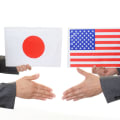Me Hey, Dali. Tell me some examples of Japanese words in English.
私 ねえ、ダリちゃん。英語になった日本語ってどんなものがある?
Dali In English language, we take some Japanese words like sake [sάːki], karaoke [k`ærəóʊki], karate [kərάːṭi], kimono [kəmóʊnə], tsunami [tsʊnάːmi], anime, manga, karoshi, kaizen, hikikomori….
ダリちゃん 英語で、日本語の単語から取ってきたものがある。例えば、酒、カラオケ、空手、着物、津波、アニメ、漫画、過労死、改善、引きこもりなど。
Me Oh, there are many. But I can’t imagine that some of them were originally Japanese, if I just heard them pronounced.
私 いろいろあるけど、ちょっと聞いただけでは、もとが日本語とわからないのもあるね。
Dali Because they all are English words. They have come into English language, but have some Japanese characteristics. They no longer are Japanese words, because pronunciation is different. They have already come into English language. We feel as though these are English.
ダリちゃん だってそれらは全部、英語だもん。多少日本語の特徴は残っているけど、英語になってしまっているんだ。もはや日本語じゃないね、だって発音が違うもん。もうすでに英語になってしまっている。わしらはこれらを英語として感じてるよ。
Me Do you?
私 そうなんだ。
Dali Among such words, karaoke is noticeable. You know, “kara” is, of course, Japanese “kara,” meaning emptiness or blank, and “oke” comes from “orchestra.” So, karaoke is a hybrid word, partly imported from English, which again came back into English. Isn’t this an interesting phenomenon?
ダリちゃん そんな中、「カラオケ」は注目すべきだね。あのね「カラ」は当然、日本語の「空(から)」、つまり、空虚、空っぽと言う意味、そして「オケ」は「オーケストラ」から来ているんだ。つまり「カラオケ」は混種語で、一部は英語から輸入されたあと、再び英語となって戻ってきたんだ。面白い現象だと思わない?
Me Oh, it’s interesting. Anything else?
私 そうだね。面白いね。他には?
Dali Sushi and sashimi are other examples. Everybody seems to understand that meaning, but some people sometimes confuse sushi and sashimi. So, if we go to a Japanese restaurant and some dish of sashimi is served, my friend might say that he doesn’t like sushi. I say “What? This is not sushi. This is sashimi.” He says, “No, no, it’s raw fish, right?” I reply, “Yes, it’s raw fish.” Then, he says with confidence, “So, it’s sushi!” Apparently, it’s a mistake. In the U.S., sushi often means raw fish. Thus, sushi might mean on one occasion nigirizushi and on another occasion sashimi, because both are raw fish.
ダリちゃん 他の例として、鮨や刺身がある。みんなが意味を知っているように見えるが、ある人たちは時々鮨と刺身をごちゃごちゃにしてるね。それでね、例えばわしらが日本食レストランに行って刺身が出されたとする。わしの友人は「鮨は嫌い」と言う。わしは「何だって? これは、鮨ではなく刺身だよ」と言う。彼は「いやいや、生の魚でしょ。違う?」と。わしは「そう、生の魚」と答える。そうすると、彼は自信満々に「じゃあ、鮨じゃん」と言う。明らかにこれは間違い。アメリカでは、鮨はしばしば生の魚を意味する。したがって、鮨はある時は「握り鮨」、またある時は刺身ということになる。どちらも生魚だからだ。
Me These are cases, in which the words themselves are well-known but the meanings are not. Anything else?
私 単語自体は有名だけど、意味が混乱して使われている例だね。他には?
Dali One more example is honcho.
ダリちゃん もう一つの例はhonchoだ。
Me What’s that? Is it “honcho” from police drama?
私 何それ? 刑事物でよく出てくる本庁のこと?
Dali Not honcho [hˈɔntʃəʊ]. It’s honcho [hάntʃoʊ].
ダリちゃん 「本庁」でなくて「班長」。
Me I see…it’s a group leader, honcho. I wonder why the honcho become to be English. It’s not the word frequently used in Japan. As the original Japanese meaning is suggested, is the English word, honcho means the leader of a small group?
私 ああ、班長のことなんだ。何故、班長が英語になってしまったのかな? 特に頻繁に日本で使われる言葉ではないけど……。で、班長だから小さなグループの長ということ?
Dali No, honcho just means a boss. We usually use this word with “head” as in “head honcho.” Although hon means a small group, head honcho does not necessarily mean the leader of a small group. It might mean the leader of a huge group. Anyway, English word, honcho depicts just a leader of any sized group.
ダリちゃん 違う。honchoはただ「ボス」と言う意味。わしらは普通headをつけてhead honchoと言う。「班」は小さなグループの意味だが、head honchoは必ずしも小さなグループのリーダーとは限らない。巨大グループのリーダーでもいい。とにかく、honchoという英語はどんなサイズのグループであれリーダーを指す。
Me Wow, the person who use such a Japanese-derived word must be restricted to Japan buffs.
私 へえ~。でもこんな日本語由来の言葉を使うアメリカ人は、きっと日本通なんだろうね?
Dali No, honcho is a common word, and even non-intelligent people may use this. In fact, “honcho” or “head honcho” is actually an expression used by people on the street. It is not particularly upper-class, like some English words from French, such as vis-a-vis (face-to-face), faux pas (false step), or en passant (by the way).
ダリちゃん いいえ。honchoはありきたりな言葉。特にインテリでなくても使ってるよ。それどころか、honchoやhead honchoは実際、庶民が使う表現だね。特に上級国民が使う言葉、例えば、フランス語由来の気取った言葉とは全く違うね。
Key Words (キーワード)
hikikomori: 引きこもり(仕事や学校に行けず家にこもり、家族以外とほとんど交流がない人の状況を指す)
pronunciation: 発音、発音の仕方
noticeable: 人目を引く、顕著な、目立つ
emptiness: 空(から)、空虚、無意味
blank: 白紙の、空白の、空の
hybrid word: 混種語(ある言葉の形態素とそれとは別の形態素を語源とした合成語のこと)
confuse: 混乱させる、わかりにくくする、区別がつかない、混同する
confidence: 信用、自信、確信
honcho: 指導者、主任、リーダー
buff: 熱狂者、ファン、~狂
people on the street: 一般の人々
vis-a-vis: 差し向かいに、相対して
faux pas: (社交上の言動の)過ち、過失、失策
en pasant: ついでに、因みに
Comments (コメント)
I was surprised to hear that the English word, honcho, which originally came from Japanese, is well known by ordinary native English speakers. Its American pronunciation is not [hˈɔntʃəʊ] but [hάntʃoʊ], which should be remembered. Although this is not English, the word, Sayonara is another Japanese word every American knows. They also know it means goodbye, but the pronunciation is somewhat different.
「honcho」が英語ネイティブの一般人にも、よく知られた日本語由来の英語だと知って驚いた。米語発音は「ホンチョウ」ではなく「ハンチョウ」なのは注意する必要がある。また、これは英語にはなっていないが、アメリカ人の誰もが知っているもう一つの日本語としてSayonara [sʌɪəˈnɑːrə]がある。意味もgoodbyeであると正しく理解しているそうである。ただ発音は微妙に違うそうである。






















